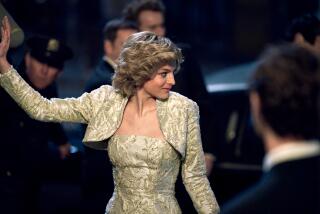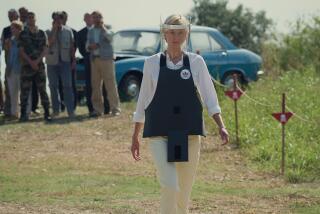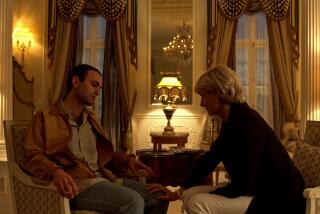Queen Recalls: The Butler Didn’t Do It
LONDON — It was a royal case of recovered memory.
Queen Elizabeth II’s late-in-the-game recollection Friday of an old conversation cleared a former butler accused of stealing possessions from the estate of Princess Diana, ending a trial that had stirred the ghosts of past royal scandals and threatened even greater tabloid mayhem ahead.
Crown prosecutors abandoned their case against the late princess’ longtime butler, Paul Burrell, 44, after the queen confirmed that Burrell had told her that he had taken some of Diana’s papers for “safekeeping” after her 1997 death.
The crown’s case had been based on the sinister premise that Burrell had absconded from Diana’s Kensington Palace home with 310 items -- from CDs to designer clothes to intimate letters -- without telling anyone.
It now turns out that he had informed not just someone, but Diana’s mother-in-law: the queen in whose name the prosecution was formally waged.
The butler-turned-small-town-florist, whom Diana once famously referred to as her “rock,” wept in the courtroom of London’s Old Bailey when it became apparent that the prosecution’s case had collapsed.
“The queen has come through for me,” he said as he emerged into the flash of cameras outside. Burrell’s first job in royal service was as a footman to Elizabeth.
But his acquittal, which will be rubber-stamped by the jury next week, raised hard questions about why the charges ever reached court.
And the widely held view of a dismal prosecution case -- plus the prospect of even more embarrassing royal revelations -- has nurtured suspicions about the timing of the queen’s realization that she possessed crucial information.
“Yes, it’s very rum, very odd indeed,” said Sarah Bradford, a respected biographer of British royalty, including the queen.
The butler had worked for Diana in the turbulent last 10 years of her life, and the possibility of a grotesque replay in court of some of those darker moments led to a widespread assumption that the royal family was eager to find any excuse necessary to stop the trial.
“It could have been a disaster for them,” said designer and leading British socialite Nicky Haslam.
The Buckingham Palace version of events is that the queen had been unaware of the trial’s details because she was on a royal tour of Canada when it began. Her memory wasn’t jogged until a week ago, when she, her husband, Prince Philip, and her son, Prince Charles, were being driven to London’s St. Paul’s Cathedral to attend a memorial service for British victims of last month’s bombing of two nightclubs in Bali, Indonesia.
In the midst of what the palace described as a “general conversation,” the queen mentioned that Burrell had told her back in 1997 that he was holding some of Diana’s items for safekeeping.
Charles, Diana’s ex-husband, swiftly recognized the potential legal importance of this, the palace said, and “immediate steps were taken to draw this to the attention of the police.”
Yet several people came forward Friday to say they had long been aware of the meeting between Burrell and the queen. Diana’s close friend Rosa Monckton recalled Burrell telling her at the time: “I’ve just had a meeting with the Boss Lady,” which is how he referred to the queen in casual conversation.
The meeting -- but none of its details -- also was mentioned in Burrell’s original 39-page statement given to police in August 2001. And it was cited again in his defense statement, the detailed outline of the defense’s case that, by law, was given to the prosecution before the trial began.
Both police and prosecutors said they never sought an explanation from Burrell or the queen about what had been said between them.
Burrell’s lawyers said their client hadn’t told them until this week that the queen was aware he was holding Diana’s things. They implied that his discretion was a measure of his loyalty to the royal family, a cornerstone of his defense. Burrell has always contended that he was merely preserving the items out of devotion to Diana and her memory.
But the crown tried to show that Burrell was not as close to the princess as he claimed. That was just one of what Burrell’s lawyer Andrew Shaw said were “numerous errors” on which the prosecution based its case.
Over 12 days of testimony, the court heard many examples of what appeared to be sloppy and overzealous police work.
Under oath, detectives admitted that they had secured support from Prince Charles and his son Prince William for their prosecution by telling them that Burrell had sold stolen “Dianabilia” to foreign collectors. They also said they would produce photos in court showing Burrell and some of the princess’ former staff members at a party dressed in some of her designer clothes.
Neither suggestion was true, police acknowledged under questioning. Worse, Det. Maxine de Brunner said she allowed Charles and William to “remain under that misconception.”
Meanwhile, defense lawyers were coaxing unsettling gossip -- of dubious legal value -- from prosecution witnesses, including Diana’s mother and two sisters.
The disclosures were messy: Diana and her mother had not spoken in the four months before her death; her brother, Charles Spencer, had refused to let her rent a house on the family estate because it would disturb his family’s life; and the princess had kept a signet ring belonging to James Hewitt, with whom she had had an affair while married to Prince Charles.
Furthermore, the defense rebuttal, which Burrell’s lawyers promised would be “long, detailed and extremely interesting,” had not even begun.
That led many to believe that the fix was in.
“But it shows the British establishment is alive and well,” Haslam said.
More to Read
Sign up for Essential California
The most important California stories and recommendations in your inbox every morning.
You may occasionally receive promotional content from the Los Angeles Times.










